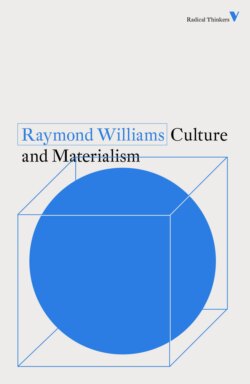Читать книгу Culture and Materialism - Raymond Williams - Страница 22
На сайте Литреса книга снята с продажи.
Residual and Emergent Cultures
ОглавлениеI have next to introduce a further distinction, between residual and emergent forms, both of alternative and of oppositional culture. By ‘residual’ I mean that some experiences, meanings and values, which cannot be verified or cannot be expressed in terms of the dominant culture, are nevertheless lived and practised on the basis of the residue—cultural as well as social—of some previous social formation. There is a real case of this in certain religious values, by contrast with the very evident incorporation of most religious meanings and values into the dominant system. The same is true, in a culture like Britain, of certain notions derived from a rural past, which have a very significant popularity. A residual culture is usually at some distance from the effective dominant culture, but one has to recognize that, in real cultural activities, it may get incorporated into it. This is because some part of it, some version of it—and especially if the residue is from some major area of the past—will in many cases have had to be incorporated if the effective dominant culture is to make sense in those areas. It is also because at certain points a dominant culture cannot allow too much of this kind of practice and experience outside itself, at least without risk. Thus the pressures are real, but certain genuinely residual meanings and practices in some important cases survive.
By ‘emergent’ I mean, first, that new meanings and values, new practices, new significances and experiences, are continually being created. But there is then a much earlier attempt to incorporate them, just because they are part—and yet not a defined part—of effective contemporary practice. Indeed it is significant in our own period how very early this attempt is, how alert the dominant culture now is to anything that can be seen as emergent. We have then to see, first, as it were a temporal relation between a dominant culture and on the one hand a residual and on the other hand an emergent culture. But we can only understand this if we can make distinctions, that usually require very precise analysis, between residual-incorporated and residual not incorporated, and between emergent-incorporated and emergent not incorporated. It is an important fact about any particular society, how far it reaches into the whole range of human practices and experiences in an attempt at incorporation… It may be true of some earlier phases of bourgeois society, for example, that there were some areas of experience which it was willing to dispense with, which it was prepared to assign as the sphere of private or artistic life, and as being no particular business of society or the state. This went along with certain kinds of political tolerance, even if the reality of that tolerance was malign neglect. But I am sure it is true of the society that has come into existence since the last war, that progressively, because of developments in the social character of labour, in the social character of communications, and in the social character of decision, it extends much further than ever before in capitalist society into certain hitherto resigned areas of experience and practice and meaning. Thus the effective decision, as to whether a practice is alternative or oppositional, is often now made within a very much narrower scope. There is a simple theoretical distinction between alternative and oppositional, that is to say between someone who simply finds a different way to live and wishes to be left alone with it, and someone who finds a different way to live and wants to change the society in its light. This is usually the difference between individual and small-group solutions to social crisis and those solutions which properly belong to political and ultimately revolutionary practice. But it is often a very narrow line, in reality, between alternative and oppositional. A meaning or a practice may be tolerated as a deviation, and yet still be seen only as another particular way to live. But as the necessary area of effective dominance extends, the same meanings and practices can be seen by the dominant culture, not merely as disregarding or despising it, but as challenging it.
Now it is crucial to any Marxist theory of culture that it can give an adequate explanation of the sources of these practices and meanings. We can understand, from an ordinary historical approach, at least some of the sources of residual meanings and practices. These are the results of earlier social formations, in which certain real meanings and values were generated. In the subsequent default of a particular phase of a dominant culture, there is then a reaching back to those meanings and values which were created in real societies in the past, and which still seem to have some significance because they represent areas of human experience, aspiration and achievement, which the dominant culture under-values or opposes, or even cannot recognise. But our hardest task, theoretically, is to find a non-metaphysical and non-subjectivist explanation of emergent cultural practice. Moreover, part of our answer to this question bears on the process of persistence of residual practices.
